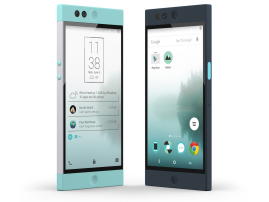Nextbit debuts cloud-centric Robin phone – and it’s almost funded on Kickstarter
Striking design in hardware and software alike, plus near-flagship Android specs at a discount

The smartphone market is overly saturated to the point where even established companies like HTC and Sony are struggling to reach customers. But there are openings for upstarts to make a dent via innovation, and that’s just what Nextbit plans to do.
Today, the company revealed the Robin (as promised), its first Android-based smartphone that they say gets better the more you use it. How so? Well, it’s designed to leverage the power of the cloud to automatically maintain your storage by learning from your own habits and usage traits.
For example, if you’re not using certain apps or accessing particular photos or other documents, the phone can pull those off automatically to free up local storage. But they’re always right there in the cloud, and you can simply tap an icon to download them once again. The Robin will run Android Marshmallow right from the start, with a pastel-tinged skin that looks stunning in screens.
The phone itself also looks very unique, especially with the Mint model, which pairs the light green with white for a distinctive design, although a Midnight blue version is also available. Both have small lights on the back that indicate when Robin is connected to the cloud. The phone looks like a little taller than we might normally expect, with a lot of bezel around the display, but there’s a fair bit to like here. It comes from Scott Croyle, designer of the HTC One (M8), so there’s a reason why it stands out so much.
The Robin opts for specs that are just below what you’ll find on top flagships, but it has perks. You’ll find a Snapdragon 808 processor within, plus 3GB RAM, 32GB internal storage, and 100GB in the cloud. It has a 5.2in 1080p scren, a 2680mAh battery that promises to be ultra-efficient, plus it has a 13-megapixel back camera with a 5MP shooter up front. As for those perks? Dual front-facing speakers, USB Type-C, and a fingerprint sensor aren’t shabby at all.
Early adopters could have snagged the phone for US$299 (about £195), but those 1000 units are already snapped up on Kickstarter. The rest are available for US$349 (about £228), with the phone planned to sell for US$399 (about £260) upon its proper retail release. Units will first hit backers in January and February before selling wide.
The campaign has raised more than US$420,000 of its US$500,000 (nearly £327,000) goal as of this writing, although we imagine it’s more about marketing than actually raising crucial launch funds. Either way, consider our interest piqued.
[Source: Kickstarter]

